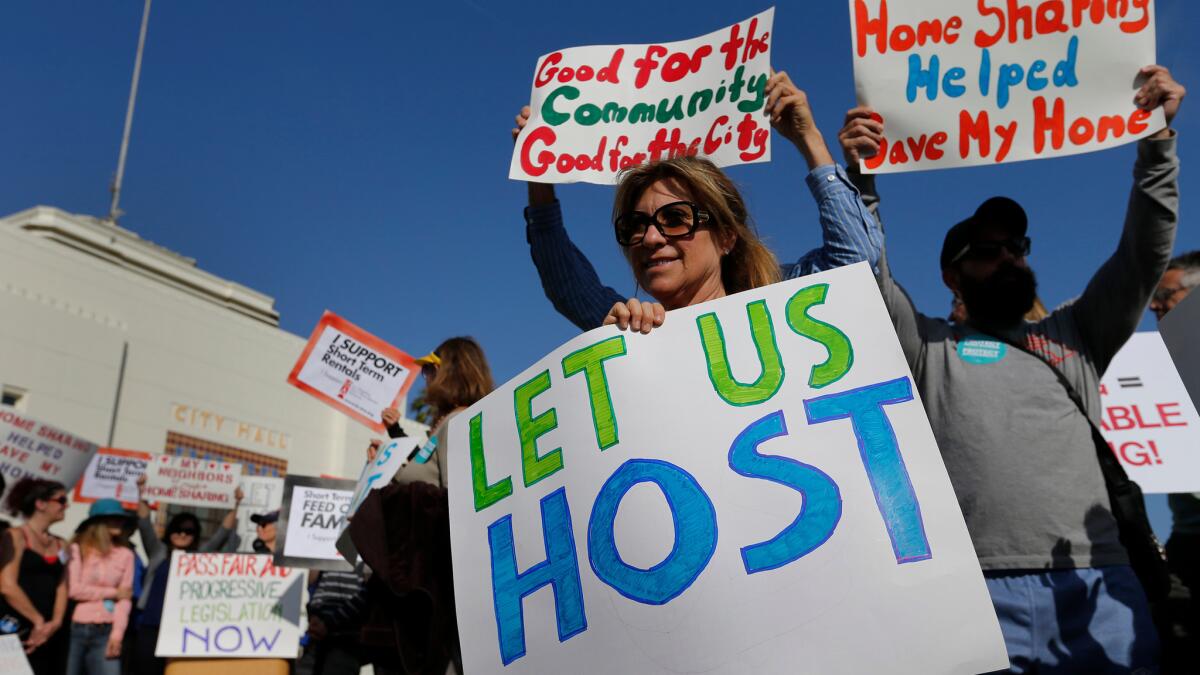Santa Monica convicts its first Airbnb host under tough home-sharing laws

- Share via
Santa Monica, which last year passed some of the nation’s toughest regulations on short-term rentals, has now convicted its first Airbnb host under the new law, prosecutors said.
Rental operator Scott Shatford, who listed five properties on Airbnb, was charged with eight misdemeanor counts of operating a business without a license and failing to comply with citations after he refused to stop renting out his properties, Deputy City Atty. Yibin Shen said Wednesday.
Shatford pleaded no contest on July 5 in a plea deal with the city, agreeing to pay $3,500 in fines and to stop renting properties within the city. He was also placed on two years’ probation.
In May 2015, the Santa Monica City Council unanimously passed a law outlawing rentals of less than 30 days. The law allows so-called home-sharing, such as renting a couch or spare room while the owner is present, but bars renting an entire residence for fewer than 30 days.
See the most-read stories in Local News this hour >>
At the time, the new rule outlawed more than 80% of the city’s estimated 1,700 short-term rentals.
The city now has a full-time task force dedicated to the issue, with two code enforcement officers and an analyst, said Shen, the prosecutor on Shatford’s case.
Shatford, a 36-year-old Santa Monica resident, wrote a book on home-sharing and runs AirDNA, a database that helps hosts price their units so they can “Airbnb like a pro.”
On Tuesday, Shatford said he had been renting vacation properties in Santa Monica for about four years and has been vocal about his doubts about whether the city could actually enforce its new law.
“I was probably targeted by Santa Monica because I was out there, talking about my rentals,” Shatford said. “The city came after me, to make me their little poster child and be able to promote me as their first victory. … It’s pretty silly.”
Shatford said he had received citations, but that they were sent to his vacation properties, where he does not regularly check the mail.
While investigating Shatford, city officials booked one of his properties near the 3rd Street Promenade on Airbnb for four nights for $1,200, collecting a rental agreement that they used as evidence, Shatford said.
“After all the time and money they spent … they’ve lost money on the whole situation,” he said.
Asked why he did not remove his rentals after the law passed last year, he said: “The money’s too good.”
“Even with the $3,500 fine, that’s what one of my properties makes in a month,” he said.
Shen, the prosecutor, said city officials received a complaint from someone who had rented one of Shatford’s properties. The woman was surprised to learn that she was renting a unit that was illegal and was uncomfortable with the situation, Shen said.
Before referring the case to the city attorney’s office, the new Vacation Rental Enforcement Task Force “attempted to work with and educate Mr. Shatford for many months, issuing multiple warnings and citations with fines,” the city said in a statement, adding that Shatford “boasted publicly that he was ‘not concerned’ about local law.”
Shen said he hopes the case will serve as an example for the public.
“The city views its rental prohibition quite seriously, and it takes enforcement of these laws quite seriously,” Shen said.
As for Shatford, he’s moving to Denver this week, after 13 years of living in Santa Monica. He said he hopes people are more tolerant there.
Los Angeles is mulling new rules that would legalize and regulate the practice of renting out rooms or whole homes for short stays, a practice that has flourished even though planning officials say it is currently illegal in vast swaths of the city. Unlike in Santa Monica, Angelenos would be able to rent out their entire home to temporary visitors while they are not present.
However, the proposed L.A. law would impose restrictions on how often they could do so: Angelenos who rent out their primary residence for short stays – those of less than 30 days -- could do so for up to 180 days annually. The Los Angeles City Planning Commission has also recommended allowing short-term rentals of other kinds of property -- such as a second home -- for a maximum of 15 days a year.
Under the L.A. proposal, hosts would face fines if they exceed those restrictions or fail to register with the city. And online rental platforms such as Airbnb could also be fined if they refuse to turn over addresses of rentals that failed to register. The proposed law was backed last month by the Planning Commission, but has yet to be discussed by the Los Angeles City Council.
Emily Alpert contributed to this report.
Twitter: @haileybranson
MORE LOCAL NEWS
Man yells racial slur, hurls rock into home of black family in Huntington Beach, police say
Crackdown on ‘Bay Boys’ surfer gang begins after years of complaints
The port that fuels L.A.’s economy and fouls its air gets a pollution-reduction team
UPDATES:
4:26 p.m.: Updated with Los Angeles policy.
Originally posted at 3:28 p.m.
More to Read
Sign up for Essential California
The most important California stories and recommendations in your inbox every morning.
You may occasionally receive promotional content from the Los Angeles Times.











